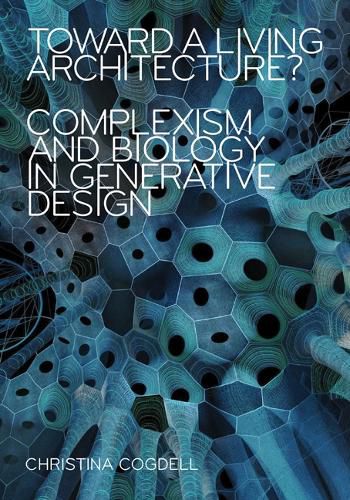Readings Newsletter
Become a Readings Member to make your shopping experience even easier.
Sign in or sign up for free!
You’re not far away from qualifying for FREE standard shipping within Australia
You’ve qualified for FREE standard shipping within Australia
The cart is loading…






A bold and unprecedented look at a cutting-edge movement in architecture
Toward a Living Architecture? is the first book-length critique of the emerging field of generative architecture and its nexus with computation, biology, and complexity. Starting from the assertion that we should take generative architects’ rhetoric of biology and sustainability seriously, Christina Cogdell examines their claims from the standpoints of the sciences they draw on-complex systems theory, evolutionary theory, genetics and epigenetics, and synthetic biology. She reveals significant disconnects while also pointing to approaches and projects with significant potential for further development. Arguing that architectural design today often only masquerades as sustainable, Cogdell demonstrates how the language of some cutting-edge practitioners and educators can mislead students and clients into thinking they are getting something biological when they are not.
In a narrative that moves from the computational toward the biological and from current practice to visionary futures, Cogdell uses life-cycle analysis as a baseline for parsing the material, energetic, and pollution differences between different digital and biological design and construction approaches. Contrary to green-tech sustainability advocates, she questions whether quartzite-based silicon technologies and their reliance on rare earth metals as currently designed are sustainable for much longer, challenging common projections of a computationally designed and manufactured future. Moreover, in critiquing contemporary architecture and science from a historical vantage point, she reveals the similarities between eugenic design of the 1930s and the aims of some generative architects and engineering synthetic biologists today. Each chapter addresses a current architectural school or program while also exploring a distinct aspect of the corresponding scientific language, theory, or practice.
No other book critiques generative architecture by evaluating its scientific rhetoric and disjunction from actual scientific theory and practice. Based on the author’s years of field research in architecture studios and biological labs, this rare, field-building book does no less than definitively, unsparingly explain the role of the natural sciences within contemporary architecture.
$9.00 standard shipping within Australia
FREE standard shipping within Australia for orders over $100.00
Express & International shipping calculated at checkout
A bold and unprecedented look at a cutting-edge movement in architecture
Toward a Living Architecture? is the first book-length critique of the emerging field of generative architecture and its nexus with computation, biology, and complexity. Starting from the assertion that we should take generative architects’ rhetoric of biology and sustainability seriously, Christina Cogdell examines their claims from the standpoints of the sciences they draw on-complex systems theory, evolutionary theory, genetics and epigenetics, and synthetic biology. She reveals significant disconnects while also pointing to approaches and projects with significant potential for further development. Arguing that architectural design today often only masquerades as sustainable, Cogdell demonstrates how the language of some cutting-edge practitioners and educators can mislead students and clients into thinking they are getting something biological when they are not.
In a narrative that moves from the computational toward the biological and from current practice to visionary futures, Cogdell uses life-cycle analysis as a baseline for parsing the material, energetic, and pollution differences between different digital and biological design and construction approaches. Contrary to green-tech sustainability advocates, she questions whether quartzite-based silicon technologies and their reliance on rare earth metals as currently designed are sustainable for much longer, challenging common projections of a computationally designed and manufactured future. Moreover, in critiquing contemporary architecture and science from a historical vantage point, she reveals the similarities between eugenic design of the 1930s and the aims of some generative architects and engineering synthetic biologists today. Each chapter addresses a current architectural school or program while also exploring a distinct aspect of the corresponding scientific language, theory, or practice.
No other book critiques generative architecture by evaluating its scientific rhetoric and disjunction from actual scientific theory and practice. Based on the author’s years of field research in architecture studios and biological labs, this rare, field-building book does no less than definitively, unsparingly explain the role of the natural sciences within contemporary architecture.